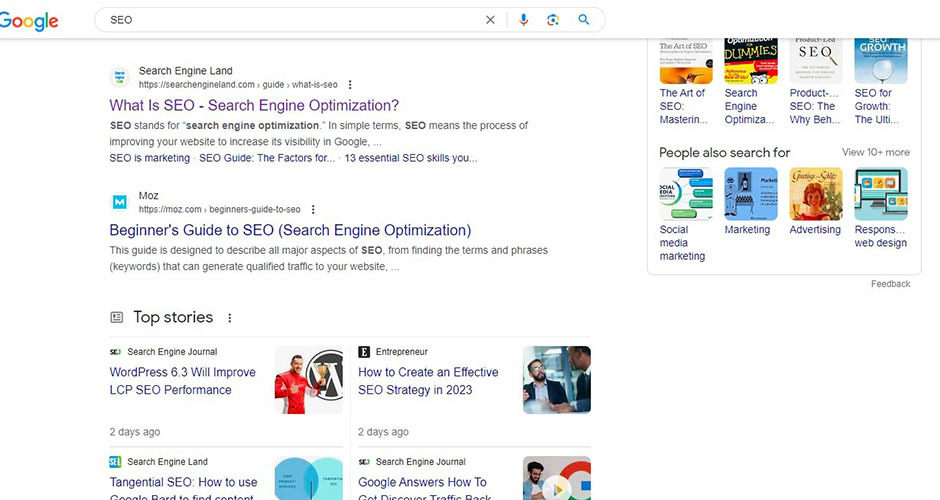In today’s digital age, having a strong online presence is crucial for businesses and individuals alike. Search Engine Optimization (SEO) plays a vital role in helping websites rank higher in search engine results, making it easier for people to discover and engage with your content. Understanding the basics of SEO is essential for anyone looking to increase their online visibility. In this blog, we will explore the fundamental principles of SEO and provide you with practical tips to optimize your website effectively.
Keywords are the foundation of SEO. Start by conducting thorough keyword research to identify the phrases and terms people use when searching for content related to your website. Tools like Google Keyword Planner, SEMrush, or Moz Keyword Explorer can assist you in finding relevant keywords with high search volumes and manageable competition. Incorporate these keywords naturally into your website’s content, including titles, headings, meta descriptions, and body text.

On-page optimization involves optimizing individual web pages to rank higher in search results. Ensure that your website is user-friendly, well-structured, and easy to navigate. Some key aspects to focus on include:

Creating high-quality, informative, and engaging content is crucial for SEO. Search engines prioritize valuable content that answers users’ queries. Ensure that your content is well-researched, relevant, and up-to-date. Incorporate your target keywords naturally, but avoid keyword stuffing, as it can harm your rankings. Regularly update your content to reflect any changes in your industry and to keep it fresh and appealing to both readers and search engines.

Building a strong network of high-quality backlinks is an essential aspect of SEO. Backlinks are links from other websites that point back to your site. They serve as a vote of confidence, indicating that your content is trustworthy and authoritative. Focus on acquiring backlinks from reputable websites within your industry. You can achieve this through guest blogging, content partnerships, or creating compelling and shareable content that naturally attracts links.

Search engines favor websites that provide a positive user experience. Ensure that your website loads quickly, is mobile-friendly, and has a responsive design. Optimize your website’s code, compress images, and use caching techniques to improve performance. Additionally, create an XML sitemap and submit it to search engines to help them crawl and index your site effectively.

SEO is an ongoing process, and monitoring your website’s performance is crucial. Utilize tools like Google Analytics and Google Search Console to track key metrics such as organic traffic, keyword rankings, and user behavior. Analyze the data regularly to identify areas for improvement and adjust your SEO strategy accordingly.

With the increasing use of mobile devices, optimizing your website for mobile users is crucial. Mobile optimization involves ensuring that your website is responsive and displays properly on various screen sizes. Mobile-friendly websites not only provide a better user experience but also receive a ranking boost from search engines. Test your website’s mobile-friendliness using tools like Google’s Mobile-Friendly Test and make necessary adjustments to improve the mobile experience.

User experience is a critical factor in SEO. Search engines aim to deliver the best possible results to their users, so they consider factors such as page load speed, bounce rate, and time spent on site when determining rankings. Enhance your website’s user experience by improving navigation, reducing clutter, and optimizing page load times. Make sure your content is easy to read and visually appealing with a clean design and clear typography.

For businesses targeting local customers, local SEO is essential. Local SEO focuses on optimizing your website to appear in location-based search results. To improve local SEO, create a Google My Business profile and provide accurate and consistent information about your business, including your name, address, and phone number (NAP). Encourage customer reviews and ratings, and include local keywords in your content and meta tags. Additionally, list your business in relevant local directories and participate in local community events to build local connections and improve your visibility.

Social media can complement your SEO efforts by increasing brand visibility, driving traffic to your website, and earning social signals (likes, shares, comments). Include social media sharing buttons on your website to encourage users to share your content. Engage with your audience on social media platforms, share valuable content, and build a strong social media presence. Although social media signals may not directly impact your search rankings, they can indirectly contribute to improved visibility and website traffic.

To maintain a strong SEO presence, regularly update and expand your content. Search engines favor websites that are regularly updated with fresh, relevant content. Consider starting a blog or news section on your website where you can publish articles, tutorials, case studies, or industry insights. Aim to create comprehensive and in-depth content that provides value to your audience. Incorporate relevant keywords naturally within the content to help search engines understand the topic and context.

Mastering the basics of SEO is an ongoing process that requires continuous learning and adaptation. By implementing the fundamental principles outlined in this blog, you can lay a solid foundation for improving your website’s visibility and attracting organic traffic. Remember, SEO is a long-term investment, and patience, consistency, and staying up-to-date with the latest trends and algorithm changes are key to achieving sustainable SEO success.